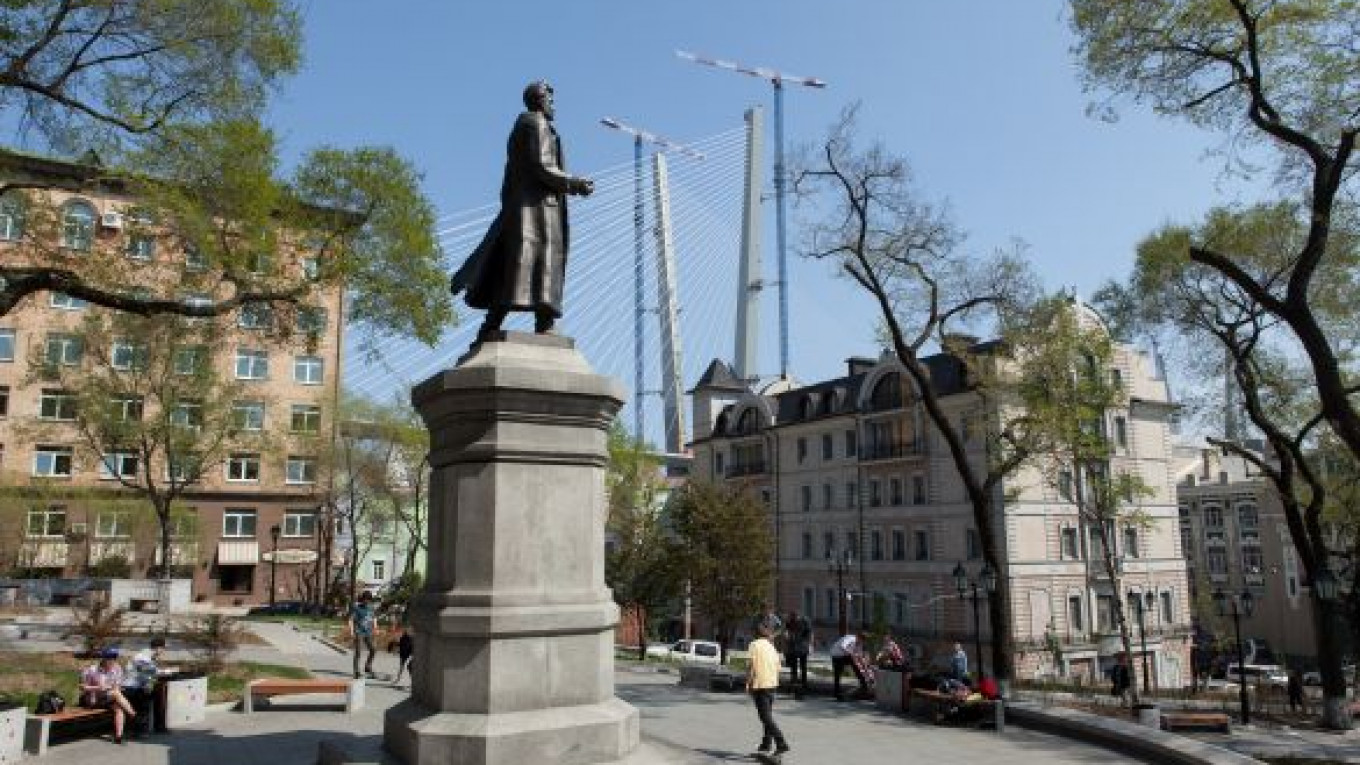VLADIVOSTOK — Perhaps there is no better way to declare your ambition to become a world-class port city than to build an extraordinarily lengthy bridge over a bay.
But there are important differences between Vladivostok’s new bridge, which seemingly can be seen from almost any point of the city, and the Golden Gate Bridge far across the Pacific Ocean in San Francisco.
The bridge to Russky Island is a silvery, cable-stayed design hung on taut wires that form gigantic triangles, rather than the sloping red arcs that frame the San Francisco Bay.
It is also slightly shorter. The suspended portion spans 1,110 meters, compared with 1,287 meters for the Golden Gate. Also, importantly, the bridge leads to a now-mostly uninhabited island. Rather than draw commuters into the city, it is intended to spur development on Russky Island, a former military base.
The bridge is the centerpiece of preparations for the Asia-Pacific Economic Cooperation organization summit in September, which the government has used as a pretext to pour money into developing Vladivostok.
Vladivostok has been in decline for years, while other cities have ruled the Pacific in trade and as cultural and financial magnets. It is a city rarely mentioned in the same context as Tokyo, Seoul, Beijing and Hong Kong.
The government is now putting the finishing touches on some $12 billion in infrastructure projects, including the $1 billion bridge and another equally expensive span, both built by the French engineering company Vinci.
Residents wonder whether the city, with a population of about 600,000 and shrinking, will reap any lasting benefits beyond a few days in the global spotlight. The summit will take place on Russky Island.
It will put Vladivostok, a quirky Pacific backwater, where the bay has been littered with sunken ships and scrap metal for decades, where Russian sailors in striped shirts stroll the sidewalks and where the Korean restaurants are North Korean, in the global spotlight.
The bridges are meant to ease movement to and from the island during and long after the summit, but many residents think the bridges and connecting roads are exceptionally costly relative to the benefit the city will gain — a kind of Russian bridge to nowhere, guided by prestige more than the logic of transportation.?
Far from welcoming the bridge, Igor Alexeyenko, 50, a Soviet-educated electrical engineer, worries it will harm his stepson’s education and future.
The one university in the region, the Far Eastern Federal University, is being moved to Russky Island, partly, he suspects, to justify building the prestigious bridge.
“For the next few years,” Alexeyenko said, “no one will be focused on studies. Everyone will be concerned with the university’s move to Russky Island.”
Alexeyenko maintains that while the new bridges will somewhat relieve traffic in the center of town, more resources should have been spent on unglamorous new overpasses and underpasses at chronically congested choke points, which would have greatly improved city traffic patterns.
“My son would rather walk the 10 minutes down the street to the old campus than make the hour-and-a-half-long trip across the bridge to Russky Island,” he said. “The students and professors feel the same about it.”
Others are more upbeat about the bridges.? “Where there are roads, there is life,” said Tatyana Stadnychuk, 41, who works in a customs clearance office. The hope is that cafes, dormitories and shopping centers will spring up around the university — covering the now-deserted, windblown land — creating a draw and traffic for the bridge.
“Thanks to APEC, the bay was cleaned of old ships and junk metal, which has helped the environment, so much so that here and in waters nearby sharks have appeared,” she said. “On the other hand, it’s frustrating to the people of Vladivostok the way Moscow dictates how we should use the sea.”
Many young people leave Vladivostok, seeking jobs or career advancement elsewhere, particularly in Moscow. Alexeyenko’s other two adult children have already moved to Moscow, where their career prospects and salaries are better.
Vladivostok now has a bridge (Prime Minister Dmitry Medvedev formally opened it this month). And the city’s hills, which slope down toward the water, much resemble those of San Francisco: covered with architecture from multiple centuries and offering lovely views of the often-foggy bay.
Yet there are still no direct flights from Vladivostok to Seattle or Anchorage (as there were in the 1990s), or San Francisco. Amazingly, regular short-hop flights to nearby Tokyo only recently began. It is not surprising then that for both Russians and foreigners, Vladivostok is evocative of nothing so much as remoteness, secrecy and inaccessibility, if not the end of the Earth.
“Vladivostok needs to become a European version of Singapore or Hong Kong,” Alexeyenko said. Then, maybe the bridge will be to nowhere — but at least it will depart from somewhere.
A Message from The Moscow Times:
Dear readers,
We are facing unprecedented challenges. Russia's Prosecutor General's Office has designated The Moscow Times as an "undesirable" organization, criminalizing our work and putting our staff at risk of prosecution. This follows our earlier unjust labeling as a "foreign agent."
These actions are direct attempts to silence independent journalism in Russia. The authorities claim our work "discredits the decisions of the Russian leadership." We see things differently: we strive to provide accurate, unbiased reporting on Russia.
We, the journalists of The Moscow Times, refuse to be silenced. But to continue our work, we need your help.
Your support, no matter how small, makes a world of difference. If you can, please support us monthly starting from just $2. It's quick to set up, and every contribution makes a significant impact.
By supporting The Moscow Times, you're defending open, independent journalism in the face of repression. Thank you for standing with us.
Remind me later.


